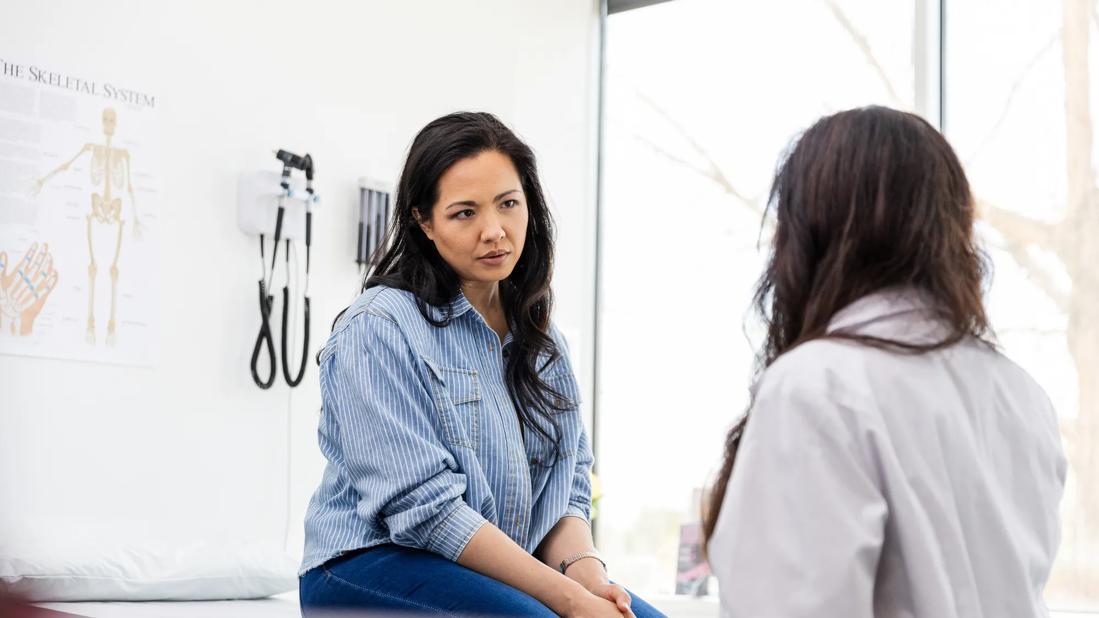When you’re living with this chronic condition, early diagnosis and treatment can improve your chances of getting pregnant down the road

Living with endometriosis can make it harder to conceive. But that doesn’t mean you need to rule out pregnancy. Minimally invasive gynecologic surgeon Megan Billow, DO, explains how endometriosis can affect your fertility and what you can do to manage the condition.
Advertisement
Cleveland Clinic is a non-profit academic medical center. Advertising on our site helps support our mission. We do not endorse non-Cleveland Clinic products or services. Policy
Studies suggest that up to half of all women with infertility have some level of endometriosis. That doesn’t mean that everyone with endometriosis will have infertility, but it does mean that fertility challenges are more common in women who have this condition.
Your uterus is normally lined with tissue called the endometrium. But with endometriosis, tissue similar to the endometrium grows in places where it shouldn’t. This can sometimes affect fertility by causing:
Advertisement
Some women with endometriosis can get pregnant, while others struggle to conceive. And sometimes, pregnancy isn’t possible.
It all depends on how your endometriosis has affected your reproductive organs — and that’s different for everyone.
“When we talk about surgical treatments for endometriosis, we discuss your desire for future fertility,” Dr. Billow explains. “Oftentimes, we can excise (or surgically cut out) areas of endometriosis but preserve the uterus, fallopian tubes and ovaries.”
Plus, she says that if you're living with endometriosis, but your ovaries can still produce eggs, you may be able to successfully get pregnant via in vitro fertilization (IVF). With IVF, the egg and sperm meet in a petri dish, removed from the inflammatory environment.
If you have endometriosis, don’t wait until you want to get pregnant to discuss the possibility with a healthcare provider.
This chronic disease can return, even after it’s been treated — and some of the treatment options can interfere with fertility. So, if you’re diagnosed with endometriosis and think you may want to become pregnant in the future, it’s important to discuss it early on with your doctor.
“Your doctor needs to know your symptoms and priorities so that they can recommend the treatment that’s right for you,” Dr. Billow emphasizes. “They’ll counsel you based on your priorities, meaning fertility versus pain, and on the extent of the disease.”
Endometriosis treatment has come a long way in recent years, letting healthcare providers better tailor your treatment to your needs and goals.
Hormonal suppression or some form of birth control can keep the disease at bay and relieve pain. But you can’t get pregnant while you’re on these medications, so they shouldn’t be part of your treatment plan if pregnancy is your immediate priority.
“If a patient has pain from endometriosis and is planning on pregnancy, we oftentimes move to surgical intervention sooner because the medical options aren’t conducive with their fertility plans,” Dr. Billow explains.
Surgical treatment for endometriosis involves removing as many lesions as possible. It may relieve your pain and boost your chances of getting pregnant. But repeated surgeries can cause scar tissue to form on your reproductive organs, which can cause problems getting pregnant down the road.
Your provider can help you weigh the pros and cons of all of these options.
If you have endometriosis and are ready to start trying to get pregnant, talk to your doctor ASAP. Your plan of action depends on factors like:
Advertisement
And if you think you might have endometriosis but haven’t been diagnosed yet, Dr. Billow says the best thing you can do is pursue a diagnosis and begin treatment. This is especially true if you eventually want to have a baby.
“If we don’t diagnose and treat it early, the disease can progress and make it harder — or impossible — to achieve pregnancy down the road,” she cautions. “So, every treatment plan we make is tailored to your unique journey of reproductive health, pain management and quality of life.”
It’s understandable if the idea of growing your family feels overwhelming when you’re living with a chronic condition like endometriosis. But improvements in endometriosis care mean that you have options. And that means that pregnancy may well be possible — even if you have to take a slightly longer road to get there.
Advertisement
Learn more about our editorial process.
Advertisement

These over-the-counter kits are 99% effective at identifying when you’re most fertile each month

Start having sex about 72 hours before ovulation, then at least every other day during your fertile window

Cancer and its treatments can cause infertility, but you have many options for fertility preservation

Specific foods won’t really affect fertility, but a healthy weight and nutritious diet are helpful

This chronic condition most commonly causes pelvic pain and severe cramping during periods, but it can bring other types of pain symptoms, too

The list includes eating a healthier diet, managing your weight and reducing stress

Watery discharge is usually normal and may happen more when you’re ovulating

Hormonal imbalances can make it harder to conceive when you’re living with CAH, but treatments are available

The tropical fruit is a good source of antioxidants and vitamin C

Most people fall asleep within 10 to 20 minutes, but if your experience is different, adjusting your sleep schedule may help

Exploring your hidden side can lead to better understanding of what makes you tick